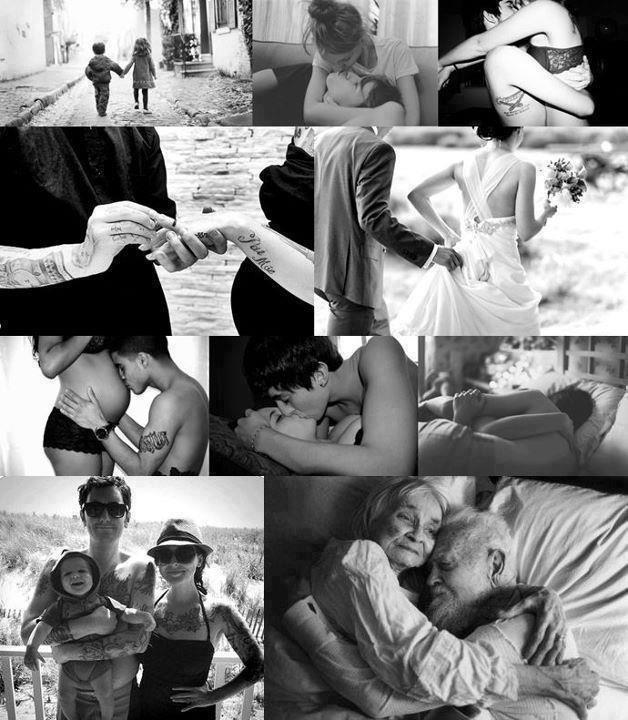 So, this was going around “The Facebook” awhile back, and every time I saw the photo, it never quite sat right with me. It’s a grand idea I suppose: grow up with someone, fall madly in love, get married, have children (I am assuming have grandchildren, as it is not in the photo), then grow old and die together.
So, this was going around “The Facebook” awhile back, and every time I saw the photo, it never quite sat right with me. It’s a grand idea I suppose: grow up with someone, fall madly in love, get married, have children (I am assuming have grandchildren, as it is not in the photo), then grow old and die together.
Every time I saw this picture, I could not figure out why it bothered me. Then I started thinking about it, and it all seemed so selfish to me. In this photo there’s this idea of a perfect love, and life. There seemed to be no room for others outside of the immediate family bubble. No serving of a greater purpose, no helping out their fellow man – just taking what they can in the way of small, temporary happiness until they die.
Then I questioned, Is this the dream a lot of us strive to, is this all we think we are capable of? I understand this is just a picture, and cannot sum up the entire human experience, but it is a highly idealized version of love, and what makes a happy life. This romanticizing of what life should be. Then it struck me. Ah ha! I thought. Should be. There it was, the crux of the problem: expectations of what life should be. This lead to another thought process of, Well, if this is what a lot of us feel life should be, or at least what we feel love should be, then we are causing ourselves a lot of undue suffering, brought on by outrageous expectations of life.
Once again, I am staring at the crux of the problem, and again, it is what it always is. The Second Noble Truth states the origin of suffering is attachment to the three kinds of desire: desire for sense pleasure (kama tanha), desire to become (bhava tanha), and desire to get rid of (vibhava tanha). Or, put another way, our attachment or aversion to things as they are right now causes suffering in our life. The attachment to this idealized version of love will cause some to suffer, if not all to suffer, because if you do achieve exactly what your mind feels it “should be”, would you now not worry about losing it? Instead of just enjoying the moment for what it is.
The mind is a neurotic little beast at best sometimes, and at worst it seems like we as humans are completely addicted to pleasure. Always wanting what’s good, never wanting to face what’s bad, just push it away and hope it goes. Always mixing up our feelings with whether or not we are happy or not. Now this made sense in primitive man: if you were warm and had a full tummy, you would most likely live another day, thereby bringing yourself closer to the goal of spreading your DNA for one more generation. These neural pathways are deeply ingrained in the primitive cortex of the brain. Pain means bad, get it away; pleasure means good, hold it tight so it won’t leave. On a very basic level, this is how we continued to evolve and further our species for thousands of years.
How does this serve us now, though? Sure, if we were animals this would be fine as it would keep us alive day to day. However, our brains have evolved to conceptualize things. Even primitive Neanderthal man had these problems. He saw his neighbor with a bigger cave and also wanted a bigger cave. Olga, his mate, often got angry when Urg was looking at the neighbor’s mate, then would refuse to mate with him, making him unhappy. We as modern day men and women have this same issue: thinking of how the situation we have right now, in this moment, could be even better. Most of us do it without ever realizing it. We label and judge things so quickly as good, bad ,or not worthy of our attention, it seems as if we have no say in this eternal inventorying going on in the mind.
This is where the root of suffering lays – this idea of the way things should be that blots out all other possibilities as acceptable. This idea that we have to grow, fall in love, marry, have kids, and die together can be so strong that we never look at any other possibility of how things could be. We just suffer because we don’t have the story we think we should have. The story is just the preconceived idea of how this or that should be. This constant inventory, “white noise” as I like to call it, in the back of the brain. It’s always there but we are too distracted to notice it. It is constantly happening and affecting our moods without us even knowing it is going on.
For me, the only solution to this has been mindfulness. Through daily mindfulness meditation I have become more aware of what is going on in the mind from moment to moment. This has allowed me a small amount of space between thought and habitual reaction. Trying to stay present in the moment and truly experience what it has to hold has been my antidote for habitual reaction, for my constant need and want for distraction from what is now in the moment.
So, this highly romanticized and conceptualized idea of what a loving relationship and life should be took me off guard some. I would see this photo and think, This is not how it is, and if it is this is somehow empty and not lasting. Truth is all things are unsatisfactory and impermanent. It is the nature of all things to fade or be temporary. It is my practice to see them as they are, and react accordingly, to walk the middle path between desire and aversion; to truly experience things as they are and love them for their very own experience,(good or bad). When they pass, I need to let them go for that is the nature of all things in samsara. It is through this practice I will truly be able to experience the here and now and be okay with whatever is in this moment – even if the experience of equanimity is in itself temporary and elusive.
-
Recent Posts
Recent Comments
Archives
Categories
Tags


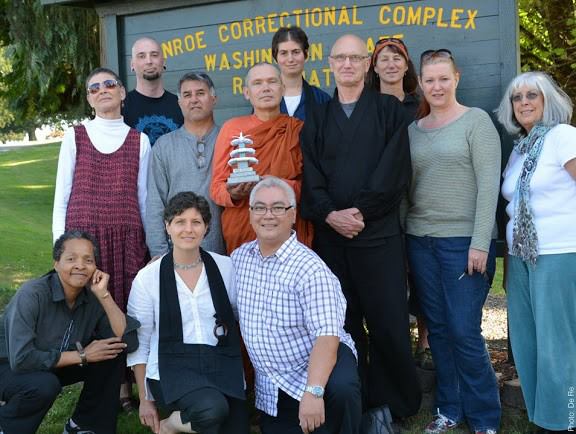 I was fortunate enough to be invited to Monroe prison for their yearly prison sangha celebration called Buddhafest.
I was fortunate enough to be invited to Monroe prison for their yearly prison sangha celebration called Buddhafest. So what are we going to do? I see people all the time on Facebook and other social networks, posting about this political thing, or that political thing. It seems like everyone is putting out a call to arms for one thing or another. But what are we really doing?
So what are we going to do? I see people all the time on Facebook and other social networks, posting about this political thing, or that political thing. It seems like everyone is putting out a call to arms for one thing or another. But what are we really doing? On the last day of retreat with
On the last day of retreat with 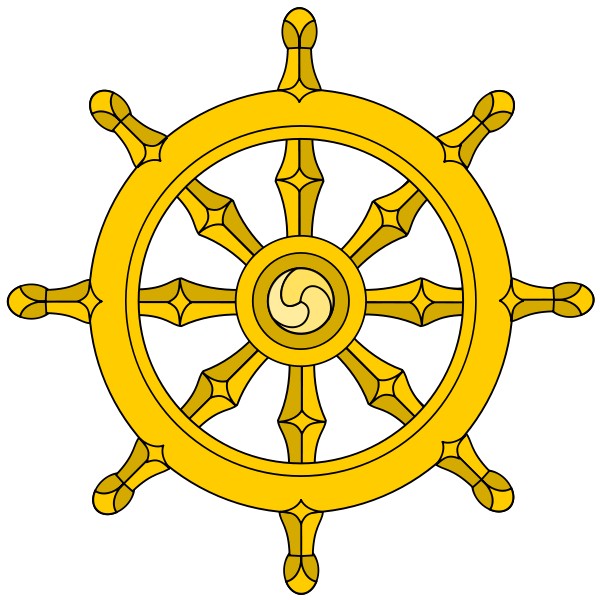 Right Action in the Eightfold Path is the second ethical principle. It pertains to the body as a means of expression, as it really involves the body’s actions. The idea of practicing the Five Precepts in our daily life comes back to Right View. If we have Right View, and can see the correctness of the Four Noble Truths in samsara; the Five Precepts will then come naturally. We will want to follow them, knowing that they will lessen suffering for ourselves and others we come in contact with.
Right Action in the Eightfold Path is the second ethical principle. It pertains to the body as a means of expression, as it really involves the body’s actions. The idea of practicing the Five Precepts in our daily life comes back to Right View. If we have Right View, and can see the correctness of the Four Noble Truths in samsara; the Five Precepts will then come naturally. We will want to follow them, knowing that they will lessen suffering for ourselves and others we come in contact with.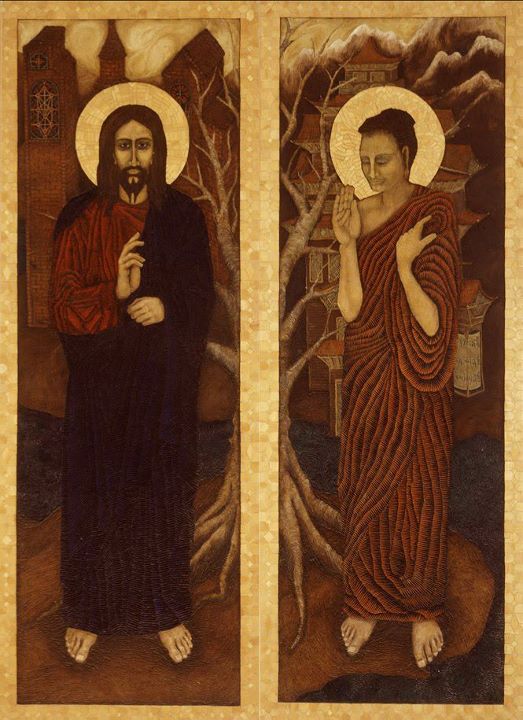 I was recently asked how I have integrated my Buddhism with an idea of a higher power. The question was hard for me to answer. I have an idea of how this works in my life, a sort of abstract feeling of how it all goes together and it works well for me. However, I could not explain it.
I was recently asked how I have integrated my Buddhism with an idea of a higher power. The question was hard for me to answer. I have an idea of how this works in my life, a sort of abstract feeling of how it all goes together and it works well for me. However, I could not explain it.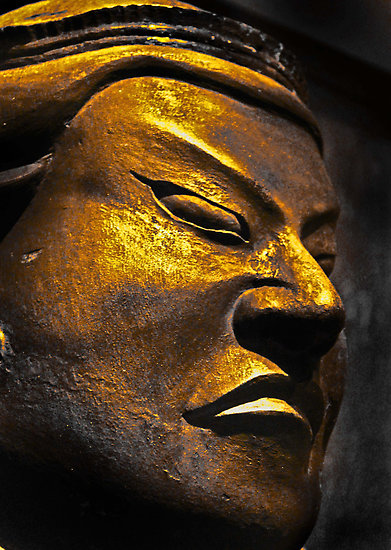 If there were no anger what would you be feeling ? I had never thought about it like that before. That one statement hit me hard and in that instant I could see what the anger really was for me. What anger had been doing for me all these years .
If there were no anger what would you be feeling ? I had never thought about it like that before. That one statement hit me hard and in that instant I could see what the anger really was for me. What anger had been doing for me all these years . I never truly knew how I felt about myself until I spent six days in silence with complete strangers. It’s the faces you see. They become mirrors of your own ill will towards yourself. You tend to project your inner self hatred onto them. Next thing you know the story in your mind is so fantastic it even comes complete with a lynch mob.
I never truly knew how I felt about myself until I spent six days in silence with complete strangers. It’s the faces you see. They become mirrors of your own ill will towards yourself. You tend to project your inner self hatred onto them. Next thing you know the story in your mind is so fantastic it even comes complete with a lynch mob.